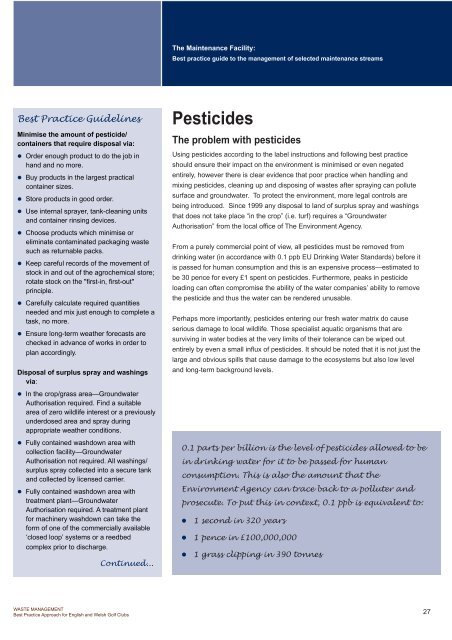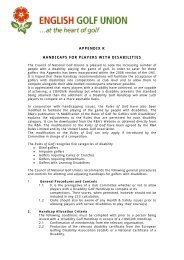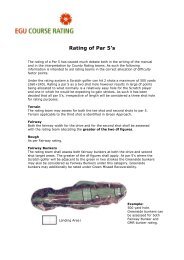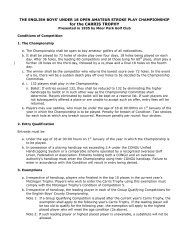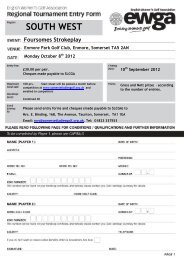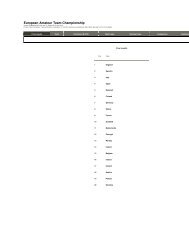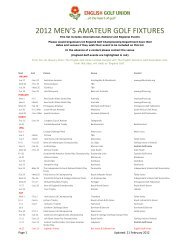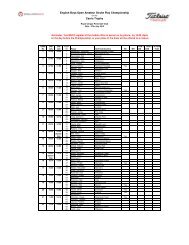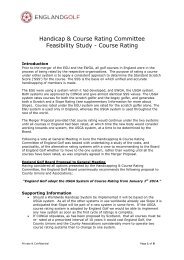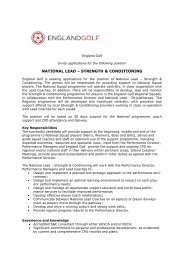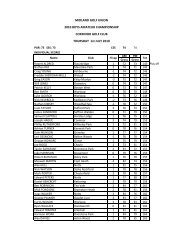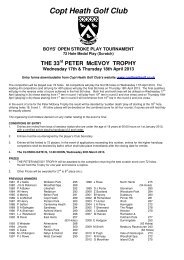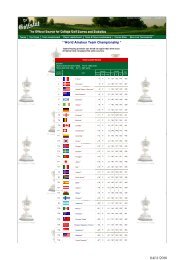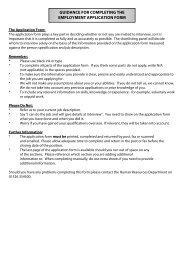Waste management - England Golf
Waste management - England Golf
Waste management - England Golf
Create successful ePaper yourself
Turn your PDF publications into a flip-book with our unique Google optimized e-Paper software.
The Maintenance Facility:<br />
Best practice guide to the <strong>management</strong> of selected maintenance streams<br />
Best Practice Guidelines<br />
Minimise the amount of pesticide/<br />
containers that require disposal via:<br />
Order enough product to do the job in<br />
hand and no more.<br />
Buy products in the largest practical<br />
container sizes.<br />
Store products in good order.<br />
Use internal sprayer, tank-cleaning units<br />
and container rinsing devices.<br />
Choose products which minimise or<br />
eliminate contaminated packaging waste<br />
such as returnable packs.<br />
Keep careful records of the movement of<br />
stock in and out of the agrochemical store;<br />
rotate stock on the "first-in, first-out"<br />
principle.<br />
Carefully calculate required quantities<br />
needed and mix just enough to complete a<br />
task, no more.<br />
Ensure long-term weather forecasts are<br />
checked in advance of works in order to<br />
plan accordingly.<br />
Disposal of surplus spray and washings<br />
via:<br />
In the crop/grass area—Groundwater<br />
Authorisation required. Find a suitable<br />
area of zero wildlife interest or a previously<br />
underdosed area and spray during<br />
appropriate weather conditions.<br />
Fully contained washdown area with<br />
collection facility—Groundwater<br />
Authorisation not required. All washings/<br />
surplus spray collected into a secure tank<br />
and collected by licensed carrier.<br />
Fully contained washdown area with<br />
treatment plant—Groundwater<br />
Authorisation required. A treatment plant<br />
for machinery washdown can take the<br />
form of one of the commercially available<br />
‘closed loop’ systems or a reedbed<br />
complex prior to discharge.<br />
Continued...<br />
Pesticides<br />
The problem with pesticides<br />
Using pesticides according to the label instructions and following best practice<br />
should ensure their impact on the environment is minimised or even negated<br />
entirely, however there is clear evidence that poor practice when handling and<br />
mixing pesticides, cleaning up and disposing of wastes after spraying can pollute<br />
surface and groundwater. To protect the environment, more legal controls are<br />
being introduced. Since 1999 any disposal to land of surplus spray and washings<br />
that does not take place “in the crop” (i.e. turf) requires a “Groundwater<br />
Authorisation” from the local office of The Environment Agency.<br />
From a purely commercial point of view, all pesticides must be removed from<br />
drinking water (in accordance with 0.1 ppb EU Drinking Water Standards) before it<br />
is passed for human consumption and this is an expensive process—estimated to<br />
be 30 pence for every £1 spent on pesticides. Furthermore, peaks in pesticide<br />
loading can often compromise the ability of the water companies’ ability to remove<br />
the pesticide and thus the water can be rendered unusable.<br />
Perhaps more importantly, pesticides entering our fresh water matrix do cause<br />
serious damage to local wildlife. Those specialist aquatic organisms that are<br />
surviving in water bodies at the very limits of their tolerance can be wiped out<br />
entirely by even a small influx of pesticides. It should be noted that it is not just the<br />
large and obvious spills that cause damage to the ecosystems but also low level<br />
and long-term background levels.<br />
0.1 parts per billion is the level of pesticides allowed to be<br />
in drinking water for it to be passed for human<br />
consumption. This is also the amount that the<br />
Environment Agency can trace back to a polluter and<br />
prosecute. To put this in context, 0.1 ppb is equivalent to:<br />
1 second in 320 years<br />
1 pence in £100,000,000<br />
1 grass clipping in 390 tonnes<br />
WASTE MANAGEMENT<br />
Best Practice Approach for English and Welsh <strong>Golf</strong> Clubs<br />
27


